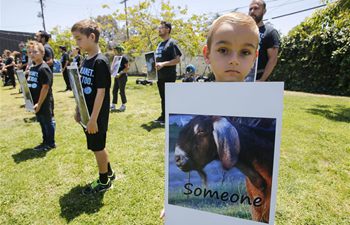WASHINGTON, June 4 (Xinhua) -- American researchers at the National Cancer Institute (NCI) have developed a novel approach to immunotherapy that leads to the complete regression of breast cancer in a patient who was unresponsive to all other treatments.
The patient received the treatment in a clinical trial, according to the findings published on Monday in the journal Nature Medicine.
"We've developed a high-throughput method to identify mutations present in a cancer that are recognized by the immune system," said Steven A. Rosenberg, chief of the Surgery Branch at NCI's Center for Cancer Research (CCR).
"This research is experimental right now. But because this new approach to immunotherapy is dependent on mutations, not on cancer type, it is in a sense a blueprint we can use for the treatment of many types of cancer," said Rosenberg.
The new immunotherapy approach is a modified form of adoptive cell transfer (ACT). ACT has been effective in treating melanoma, which has high levels of somatic, or acquired, mutations.
However, ACT has been usually less effective with some common epithelial cancers, or cancers that start in the lining of organs that have lower levels of mutations, such as stomach, esophageal, ovarian, and breast cancers.
In an ongoing phase 2 clinical trial, the investigators are developing a form of ACT that uses tumor-infiltrating lymphocytes (TILs) that specifically target tumor cell mutations to see if they can shrink tumors in patients with these common epithelial cancers.
As with other forms of ACT, the selected TILs are grown to large numbers in the laboratory and are then infused back into the patient to create a stronger immune response against the tumor.
A patient with metastatic breast cancer came to the trial after receiving multiple treatments, including several chemotherapy and hormonal treatments, which had not stopped her cancer from progressing.
To treat her, the researchers sequenced DNA and RNA from one of her tumors, as well as normal tissue to see which mutations were unique to her cancer, and identified 62 different mutations in her tumor cells.
The researchers then tested different TILs from the patient to find those that recognized one or more of these mutated proteins. Then TILs recognized four of the mutant proteins, and the TILs were expanded and infused back into the patient.
She was also given the checkpoint inhibitor pembrolizumab to prevent the possible inactivation of the infused T-cells by factors in the tumor microenvironment.
After the treatment, all of this patient's cancer disappeared and has not returned more than 22 months later.
"If confirmed in a larger study, it promises to further extend the reach of this T-cell therapy to a broader spectrum of cancers," said Tom Misteli, director of CCR at NCI.
Investigators have seen similar results using mutation-targeted TIL treatment for patients in the same trial with other epithelial cancers, including liver cancer and colorectal cancer.













